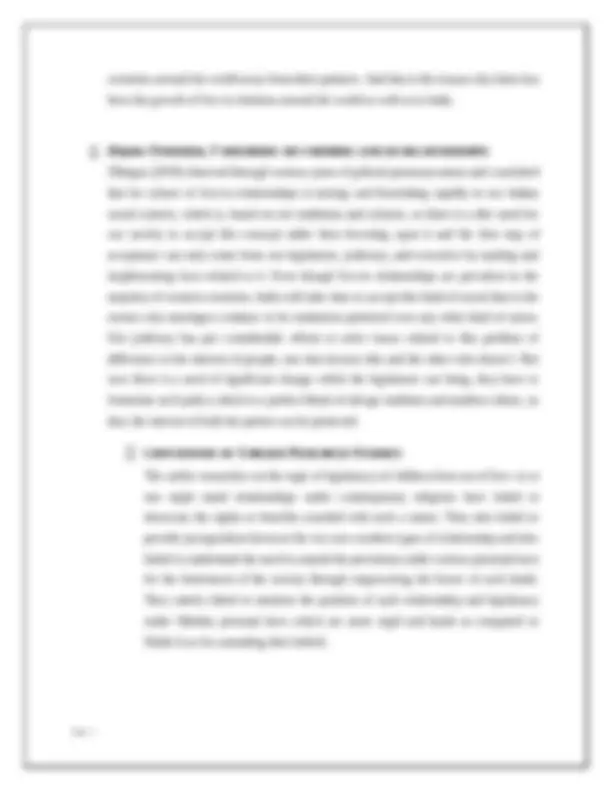












Study with the several resources on Docsity

Earn points by helping other students or get them with a premium plan


Prepare for your exams
Study with the several resources on Docsity

Earn points to download
Earn points by helping other students or get them with a premium plan
Community
Ask the community for help and clear up your study doubts
Discover the best universities in your country according to Docsity users
Free resources
Download our free guides on studying techniques, anxiety management strategies, and thesis advice from Docsity tutors
Legitimacy of child born out of one night stand and live in relationships.
Typology: Thesis
1 / 18

This page cannot be seen from the preview
Don't miss anything!











Objective of the Research................................................................................................................ 3 Research Methodology.................................................................................................................... 3 Literature Review............................................................................................................................. 4 Limitations of Earlier Research Studies.......................................................................................... 5 Chapterization.................................................................................................................................. 6 Chapter 1- Introduction.................................................................................................................... 6 Chapter 2- Contemporary Analysis of Live – In Relationship........................................................ 8 First Recognition in the Indian Judicial System.............................................................................. 9 Living Together under the Ambit of Right to Life.......................................................................... 9 Chapter 3- Approach under Muslim law & religious Traditions................................................... 11 Chapter 4- Contemporary Analysis of One Night Stand Relationship.......................................... 12 Chapter 5- Conclusion................................................................................................................... 14 References...................................................................................................................................... 16
Whether a child would be awarded the status of legitimacy with all the rights even if, born without wedlock?
For the purpose of this research study, the universe and population includes people of India both urban and rural areas.
The research usually depend on the secondary source of data collection which would be analyzing research papers, books, articles and reports on Hindu and Muslim Personal Laws for determining and comparing the legitimacy of children under different circumstances.
Joshi (2019) observed and reiterated that a clear view on the status and rights of children born out of live-in relationship is to be given by the courts and legislature. As this will ensure uniformity and will help to secure the future of such children. But the society prefers and recommends having children to be born out of the marriage so that they are entitled to and could claim the right to ancestral property also the right to acquire the self-acquired property. Also, there has been steady growth of live-in round the world and not just in India because of the impact of globalization and because families have broken up and the life partners have to stay outside and alone in different cities of different
countries around the world away from their partners. And this is the reason why there has been the growth of live-in relations around the world as well as in India. ANJALI DHINGRA, FAVOURING OR FAWNING LIVE-IN RELATIONSHIPS Dhingra (2019) observed through various years of judicial pronouncement and concluded that he culture of live-in relationships is mixing and flourishing rapidly in our Indian social context, which is, based on our traditions and cultures, so there is a dire need for our society to accept this concept rather than frowning upon it and the first step of acceptance can only come from our legislature, judiciary, and executive by making and implementing laws related to it. Even though live-in relationships are prevalent in the majority of western countries, India will take time to accept this kind of social that is the reason why marriages continue to be institution preferred over any other kind of union. Our judiciary has put considerable efforts to solve issues related to this problem of difference in the interest of people; one that favours this and the other who doesn’t. But now there is a need of significant change which the legislature can bring, they have to formulate such policy which is a perfect blend of old age tradition and modern culture, so that, the interest of both the parties can be protected.
The earlier researches on the topic of legitimacy of children born out of live- in or one night stand relationships under contemporary religions have failed to showcase the rights or benefits awarded with such a status. They also failed to provide juxtaposition between the two new modern types of relationship and also failed to understand the need to amend the provisions under various personal laws for the betterment of the society through empowering the future of such kinds. They utterly failed to mention the position of such relationship and legitimacy under Muslim personal laws which are more rigid and harsh as compared to Hindu Law for amending their beliefs.
applicable in other countries. However, there is a latent assumption that only the children born through legal and valid wedlock must be considered as legitimate and true heir of their parents and must be obliged with the succession and ancestral property rights. But we cannot directly jump to this conclusion before carefully examining various facets of children born without any wedlock, such as in the instances of Live –In Relationship and One Night Stands (Consensual). Let us first understand the proper meaning of the term “marriage” from Indian perspective by going through the essentials under Hindu Marriage Act, 1955 for clear legal standing of any concerned relationship in the eyes of law. Section 5 of the Hindu Marriage Act provides some essentials for valid marriage such as:- “Both the parties must not have any legally existing first marriage at the time of the concerned marriage. Both the parties are not incapable of giving a valid consent due to u0nsoundness of mind at the time of concerned marriage. Both the parties should not be suffering from any mental disorder of such a kind or to such an extent as to be unfit for marriage and the procreation of children at the time of marriage (for not clouding consent for marriage). Either one of the party is subject to recurrent attacks of insanity. Both the concerned parties are of legal age at the time of marriage (Prospective husband - 21 years & Prospective Wife - 18 years). The concerned parties are not within the degrees of prohibited relationship unless the custom or usage governing each of them permits of a marriage between them. Both the parties must not be Sapinda (Blood relation) of each other”^1. Thus, any child born out of such marriage fulfilling all these essentials must be termed as Legitimate and would acquire all the rights pertaining to it, but the status of the legitimacy of children other than this ambit (such as Live – In and One Night Relations) and their juxtaposition (Comparison) will be provided in the coming segments through deep analytical (^1) Hindu Marriage Act, 1955, § 5.
research of case laws, existing provisions, exposition of various taboos and customs and traditions of various religions (mainly Hindu & Muslim) for better and crystal understanding.
Live – In Relationship is a modern and western culture which was first showcased in the late 1990’s. In this, two parties live together in the same house for a period of time without getting legally married and performing all the duties and responsibilities similar to that of married couple. Basically they cohabit together and provide physical and mental support just as that of marriage. This might be the acceptance from the western societies and developed countries such as USA, England, and France etc., but this was not the case of developing countries mainly India as the
Now coming back to one of the fundamental question of this paper “legitimacy of children born out of live- in relationship”, it can be analytically construed and answered through the following section:- DETERMINATION OF LEGITIMACY In the case of SPS Balasubramanyam V. Sruttayan^5 , the apex court for the first time upheld the legitimacy of the children born out of a live-in relationship as they specifically held that if a man and woman are living under one house, fulfilling the said responsibilities and cohabiting for some years, there will be a valid interpretation under Section 114 of the Evidence Act^6 that the children born to them will not be termed as illegitimate. Also in the case of Tulsa & Ors V. Durghatiya & Ors^7 held that a child born from live- in relationship will no longer be considered as an illegitimate child. The crucial pre-condition for a child not to be treated as illegitimate is that the parents must have lived under one roof and co- habited for a significantly long time for society to recognize them as husband and wife and it must not be a casual relationship without any seriousness from both the ends. Again, the Supreme Court of India after a heated debate ruled in the case of Radhika v. State of M.P. that if a man and woman are involved in live in relationship for a long period, they will be treated as a married couple and their child would be called treated as legitimate child just like that of legally married couple. The Supreme Court recently held that adults have the right to be in a live-in relationship, even if they have not attained the legal age for marriage. SUCCESSION AND INHERITANCE RIGHTS As per the Hindu Succession Act, children born out of wedlock are not entitled to succeed their father but are deemed to be related to their mother and through her, other legitimate descendants and can inherit from her and she too can inherit from him/her^8. (^5) SPS Balasubramanyam V. Sruttayan, 1994 AIR 133, 1994 SCC (1) 460 (India). (^6) Indian Evidence Act, 1872, §. 114. (^7) Tulsa & Ors V. Durghatiya & Ors, 2008 SC 1193 (India). (^8) Sneha Shannon Memon, Property Rights Of Live-In Couples & Their Children, Makaan.com IQ, https://www.makaan.com/iq/legal-taxes-laws/property-rights-in-live-in-relationship.
A child born out of wedlock also does not acquire any interest in the ancestral property of the father nor a coparcenery in the joint family but his/her father may choose to give him/her a share equal to that which he gives his other children. But children born in a long term live-in relationship will be considered legitimate in every way, thus they will get all the rights as that of a traditionally legitimate child such as ancestral and coparcenery rights. All these provisions and judgments were acceptable legally and religiously under Hinduism but the situation in the society was entirely opposite when it comes to Muslim religion.
Muslim section of the society is still completely against the practice of live in relationship as they believe that it will destroy the trust of Allah as it is not mentioned in Quran and its practice would result in disobedience of Allah (god). Islam considers “marriage” as a civil contract between the two parties and marriage is considered as a sign of bonding between both the concerned families. But, living without marriage has not been recognized under Muslim law due to rigid traditions and customs. The legitimacy of children under Muslim law is directly proportional to valid marriage following all the necessary conditions under the concerned personal laws. Thus a child can be considered legitimate only if he is born in lawful wedlock. Following the child will be a legitimate child with established paternity and maternity rights and benefits such as succession and inheritance. Only direct or indirect marriage (not including live- in relationship) between the father and the mother of a child can establish the legitimacy of children. PROVISIONS FOR PROVING AN INDIRECT MARRIAGE There is cohabitation of the father and the mother. The father acknowledges the mother as his wife.
for fulfilling their physical and sexual needs and desires without having any emotional feelings or baggage for their concerned partner for one specific night or for a limited time period. Any sexual intercourse that takes place by choice or by chance or by accident is not a marriage or an indirect marriage (in the case of Muslim religion) or even in the ambit of live- in relationship as there is no susceptibility of emotional support or performing any duties or responsibilities similar to that of marriage. ASCERTAINING LEGITIMACY OF THE CHILD The Bombay High Court, in one of the cases in 2017 held that any child born out of one night stands or any casual physical relationship cannot be treated or termed as a legitimate same as a child born from wedlock^9. As it does not fall within the ambit of legal and valid definition of marriage in any personal laws which abide the people of our country. We cannot even put it under the heading of live in relationship or bigamy as it lacks the criteria of commitment in the relationship to be assured or verified as a potential couple to look after the child together. SUCCESSION & PROPERTY RIGHTS As we can clearly see from the judicial trend in our country and even from the mindset of the people that they are not willing to accept such children as legitimate and provide them rights that other kids with regular parental relationship usually do. This means that they clearly do not enjoy succession or inheritance rights of any ancestral property or business as they cannot even be a coparcenery in a joint family business. The Bombay High Court also ruled a landmark judgment that the child of such kind may not get the right over his father’s property or assets. This means that they cannot legally challenge in the court of law for demanding such rights over the father‘s property as they are not even considered as his legitimate child in the eyes of law. They mentioned the word “May” in their ruling due to the factor that sharing of such property entirely depends upon the will of the father without having any legal obligation. The same is not in the case of maternal (^9) One-night stand is not marriage under law, Times of India, http://timesofindia.indiatimes.com/articleshow/59076710.cms? utm_source=contentofinterest&utm_medium=text&utm_campaign=cppst.
rights as both can demand each other property without facing any legal complication as the law regards the relationship of mother and child much closer in such type of arrangement. All these propoundments about legitimacy and succession & inheritance rights are similar for both the Muslim and Hindu Personal Law as it is still a farfetched idea to consider one night stand or casual dating under the ambit of marriage to determine the legality status of their resultant offspring.
As we have came to the end of this paper we can easily deduce the juxtaposition between live in relationship and one night stands casual relationship regarding the legitimacy of children born out of it. Live- in relationship for a long period has recently recognized acknowledgment as valid practice under Hindu Law through various judicial proponents and decisions of landmark mark
the cases of live- in relationship thus making the issue with one night stands a lot for their evolution plate of amends and revolution. But we have to see and make sure that they get persuade through constant pressure to provide legitimacy status to all kind of children without any discrimination and without any stipulation by religious beliefs as our society is evolving and with it, evolving people’s mindset to live their life the way they want and to conduct their relationships accordingly without any societal pressure. Thus making such kinds of situation more often and recurrent and we cannot deprive all these children from these basic rights for their existence.
Hindu Marriage Act, 1955
Muslim Personal Law (Shariat) Application Act, 1937 Hindu Adoption and Maintenance Act, 1956
Dinshah Fardunji Mulla, Principles of Hindu Law Satyajeet Atul Desai, Mulla Hindu Law Werner Menski, Hindu Law: Beyond Tradition and Modernity, S.R. Myneni’s, Muslim Law Tahir Mahmood & Saif Mahmood, Introduction to Muslim Law
Sneha Shannon Memon, Property Rights of Live-In Couples & Their Children, Makaan.com IQ, https://www.makaan.com/iq/legal-taxes-laws/property-rights-in- live-in-relationship. Guest Post, One-night stand is not marriage under law, Times of India, http://timesofindia.indiatimes.com/articleshow/59076710.cms? utm_source=contentofinterest&utm_medium=text&utm_campaign=cppst. Guest Post, Legitimacy and Parentage under Muslim Law, https://www.toppr.com/guides/legal-aptitude/family-law-i/legitimacy-and- parentage-under-muslim-law/. Krishnendra Joshi, Legal Status of Children Born Out of Live-In Relationship, https://blog.ipleaders.in/legal-status-of-children-bornoutofliveinrelationship/ #:~:text=Under%20Hindu%20Succession%20Act%2C1956,in%20the%20Joint %20Family%20Property.&text=Maintenance%20which%20is%20often %20talked,born%20out%20of%20such%20relationship. Anjali Dhingra, Favouring or fawning live-in relationships, https://blog.ipleaders.in/live-in-relationships-3/.
www.jstor.org